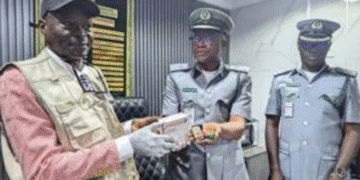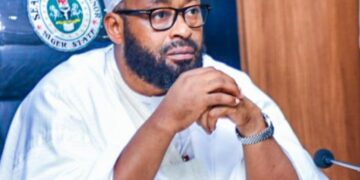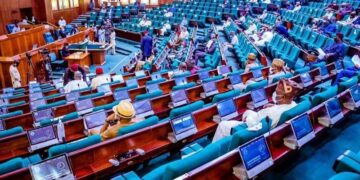By Emameh Gabriel
I have deliberately chosen this title because it reflects the uncomfortable reality we can no longer afford to ignore. While the truth may be painful to confront, we must face it with clear eyes.

Last Thursday will forever be etched in Nigeria’s memory as a day of unimaginable horror. Without warning, the skies opened, and torrential rains transformed a once bustling market community in Niger State into a watery grave. At least 150 persons have been reported lost, mothers, fathers, children, snatched away in an instant and thousands others displaced. Their homes and livelihoods, all swallowed by the flood’s merciless rage. And still, the nightmare grows worse by the hour, as rescue teams claw through the wreckage, dreading what they might find next. The Niger River has become a thief. Even now, it may still clutch the missing in its deadly embrace.
The images are heart-wrenching: submerged homes, families wading through chest, deep water, farmlands turned to swamps, and the weary faces of those who have lost everything, again. The recent floods, as reported by both local and international media, are not just another seasonal occurrence; they are a devastating reminder of a cycle Nigeria seems tragically unable to break.
Yet, as the waters recede, one painful truth remains, this will not be the last disaster of the year. The question is not if another flood will come, but when. And when it does, will Nigeria be better prepared?
We were warned. In February 2025, the Minister of Aviation, Festus Keyamo, presented precise flood projections for eight high risk states at a public presentation of the 2025 Seasonal Climate Prediction (SCP), where he sounded the alarm that between May and June 2025, high-intensity rainfall is expected to trigger potentially devastating floods.
The hardest truth to swallow is this: this will not be the last disaster of the year. The rains will return, the rivers will swell again, and unless something changes, we will be back here, grieving the same losses, asking the same questions.
It doesn’t have to be this way. Floods are natural, but disaster is man-made. Between the warnings we ignore, the infrastructure we neglect, and the policies we fail to enforce, we are complicit in our own suffering. We know the floods are coming, NiMet tells us, year after year. Yet when the water rises, we act surprised, as though we had not been warned. The problem is not a lack of information; it is a lack of action. Early warnings must stop being words on paper and become sirens that trigger movement.
When NiMet predicts heavy rainfall, it should mean immediate evacuation plans in flood prone areas, not just another report filed away in government offices. Communities should hear these alerts in ways they understand, through local radio, town criers, text messages in their own languages. A warning is useless if it doesn’t reach the grandmother in her village, the fisherman by the river, the market trader who doesn’t watch the news. And when those warnings come, there must be trust, trust that the government will act, trust that leaving their homes now means saving their lives later.
Then there are the dams, silent time bombs waiting to explode. The Lagdo Dam in Cameroon is not a secret; its releases have triggered Nigerian floods for decades. Yet the buffer dam meant to protect us, the Dasin Hausa Dam, remains unfinished, caught in the web of delays and corruption.
Just last year, Borno State was shattered. On September 9, 2024, disaster struck Maiduguri when the Alau Dam, broken and failing, gave way under the weight of neglect. The raging waters surged just 20 kilometers from the city, swallowing homes, dreams, and hope in their path. In an instant, 40% of Maiduguri was drowned in floodwaters, leaving behind a trail of devastation. Over 400,000 souls, mothers, fathers, children were ripped from their homes, their lives turned upside down in a single, merciless blow.
The pain still lingers. The scars remain. And the question hangs heavy in the air, when will we learn?
Every year, water surges downstream, and every year, we act as though it is an unforeseen tragedy. It isn’t. It is a policy failure. Completing that dam is not just infrastructure; it is a lifeline. And even without it, better coordination between states and the federal government could prevent the sudden, deadly releases that catch villages off guard. Dam management should not be a guessing game. If water must be released, let it be done gradually, with communities alerted days in advance. Those who live downstream should not pay the price for decisions made behind closed doors.
But the water doesn’t only come from rivers and dams, it rises from our own neglect. In Lagos, Port Harcourt, Abuja, and so many other cities, the floods are as much our creation as nature’s. Drains meant to channel water away are clogged with plastic bags and debris, turning streets into rivers. Buildings stand where water should flow, because someone paid a bribe to ignore zoning laws. Contractors pocket money meant for drainage projects, leaving behind shallow, broken canals that collapse under the first heavy rain. We see the consequences every year, cars submerged, businesses ruined, diseases spreading in stagnant water, and yet, when the floods recede, we go back to the same habits. Drains are left to choke on garbage until the next disaster. New buildings spring up on wetlands because no one stops them. We cannot blame the rain for floods when we have refused to prepare for it.
And then there is the larger, unavoidable truth: climate change is here. The rains are heavier, the floods more frequent. What used to be once-in-a-generation disasters now happen every few years. Nigeria cannot afford to pretend this is temporary. We must adapt, not just react. Roads and bridges in flood-prone areas should be built higher, stronger. Wetlands and mangroves, nature’s own flood barriers, should be protected, not bulldozed for new estates. Farmers, who lose everything when the water comes, should have access to insurance, something to soften the blow when their crops wash away. Climate change didn’t start here, but its consequences are ours to face. We can either plan for it or keep pretending it is not happening until the next flood forces us to pay attention.
Behind all of this are the people, the real cost of our inaction. The woman who spent years saving for her small shop, only to watch it vanish under the floodwaters. The family swept in their sleep at night by unexpected flood. The farmer who planted with hope, only to see his fields drown before harvest. The children who miss school because their classrooms are underwater, again. These are not just “flood victims.” They are Nigerians failed by a system that knows what’s coming but does too little to stop it. How many more lives must be disrupted before we act? How many more times will we see the photos of families stranded on rooftops and say, “This is so sad,” before we do what it takes to prevent it? Relief materials after the fact are not enough. Sympathy is not enough. We need prevention.
The next floods are coming. That is inevitable. But the scale of the suffering is not. Nigeria has the knowledge, the resources, and the ability to change this story. What we lack is urgency. We keep treating floods like an unavoidable tragedy instead of a solvable problem. The solutions are not mysteries, better warnings, maintained drains, enforced building laws, completed dams, climate adaptation. These are not impossible tasks. They are choices.
When the waters rise again, and they will, will we have done everything we could to protect our people? Or will we once again stand knee-deep in regret, saying, We should have acted sooner? This doesn’t have to be our fate. This year’s floods do not have to be next year’s repeat.
Mokwa today, another town tomorrow. Until we act, this won’t be the last. It never is













































Discussion about this post